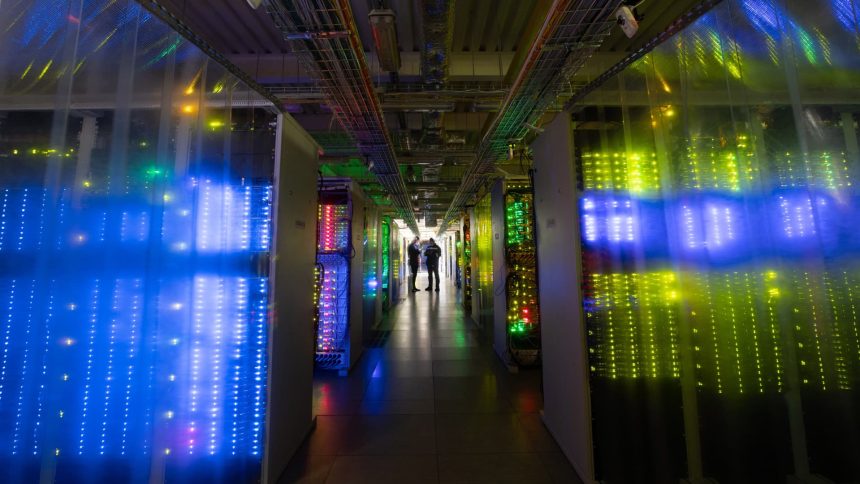A crucial question looms over the busy slate of Big Tech earnings that kicks off Tuesday night: Is the massive spending on generative artificial intelligence generating the returns that justify the investment? Club holding Alphabet ‘s second-quarter report last week – which featured hefty capital expenditure outlays and guidance that they will continue – rekindled the debate about AI’s short-term impact on profits and the timeline to see a substantial financial lift. A belief that the Google parent was spending too much helped drag its stock down and set the tone for the other megacap technology firms reporting earnings this week. Microsoft kicks off the action Tuesday night, followed by Instagram owner Meta Platforms on Wednesday, and Amazon and Apple on Thursday. This week’s tech earnings onslaught also come against the backdrop of July’s so-called “great rotation” into small-cap stocks and other parts of the market that had been lagging AI winners. In his Sunday column , Jim Cramer wrote that these earnings reports will test that rotation narrative. The Club stands firmly in the camp that AI initiatives will pay off over time. “The spending is worthwhile for now because these companies need to maintain their technological leadership,” said Jeff Marks, the Club’s director of portfolio analysis. “Risking investment is risking their futures,” he added. Still, we wouldn’t be surprised if Alphabet’s peers also see a negative response on Wall Street this week if they disclose higher AI-related expenses without sizable earnings beats. In other words, elevated spending is tougher to tolerate in a non-blowout quarter. Another way to help “take the sting away” is management teams providing a rationale behind the spending, Jim also wrote Sunday. Alphabet’s second-quarter capex of $13.2 billion was up 91% year over year and higher sequentially from $12 billion in the first quarter. Most of the money is going toward AI infrastructure including servers and data centers. On the earnings call, executives maintained previous guidance that quarterly capex for the remainder of the year will be at or above first-quarter levels. “When we go through a curve like this, the risk of underinvesting is dramatically greater than the risk of overinvesting for us here,” Alphabet CEO Sundar Pichai said on the call. The comment came in response to a question about whether there may be excess AI computing capacity in the coming years if current spending rates continue. Since the launch of ChatGPT in late 2022 sparked the generative AI boom, a shortage of AI computing resources has been an issue for the industry. Alphabet’s full-year capex spending is expected to total nearly $50 billion, according to estimates compiled by FactSet. That’s significantly higher than the $31.5 billion and $32.3 billion it spent in 2022 and 2023, respectively. Alphabet reaching or exceeding $50 billion in capex is “likely to elevate concerns” regarding free cash flow and earnings-per-share estimates for 2025, KeyBanc Capital Markets said in its post-earnings research note on July 23. “Capital intensity may impede free cash flow growth,” analysts continued, but added “it is hard to be too critical of Alphabet’s capex investment given Alphabet has proven history of AI returns.” KeyBanc is right to defend the spending because, in our minds, Alphabet’s quarter already showed its bets are paying off. Not only did its cloud-computing arm Google Cloud demonstrate revenue growth of 29%, but management said its newly launched AI Overviews are boosting engagement for its key search-engine business. While those details weren’t enough to quell concerns about overspending, we found them encouraging and supportive of our multiyear optimism on AI. For the companies reporting soon – particularly Microsoft, Meta Platforms and Amazon – we’re hopeful that executives can provide similar updates on how AI is impacting financials already along with expectations for future benefits. Apple, for its part, is in a different camp, with much of the focus on the upcoming iPhone launch and management’s expectations on how AI features will stoke demand. Meanwhile, Apple said in a paper published Monday that it used Alphabet’s custom chips to train its AI models. Investors fretting about AI spending is not entirely new. In Meta’s first-quarter report on April 24 , management raised its capex outlook for 2024 and said it expects a year-over-year increase in 2025, as well, to support AI research and development. The stock fell nearly 11% the following day on overspending concerns. But by early June, the stock had recovered all those losses due, in part, to recognition that Meta can benefit from AI through higher user engagement on its social media apps and advertising efficiency. Not everyone on Wall Street shares our belief that AI spending will prove worthwhile – and that skepticism helps inform why some investors sold Alphabet after the quarter and why we could see negativity toward Microsoft, Meta and Amazon this week. “The AI world is too complacent in its assumption that AI costs will decline over time,” Goldman Sachs’ head of global equity research, Jim Covello, wrote in a late June note to clients. “While the question of whether AI technology will ever deliver on the promise many people are excited about today is certainly debatable, the less debatable point is that AI technology is exceptionally expensive, and to justify those costs, the technology must be able to solve complex problems, which it isn’t designed to do,” Covello contended. Some of Wall Street’s AI optimists, on the other hand, are expecting this week’s reports to check important boxes. Wedbush Securities acknowledged that AI-driven capex will accelerate across the industry, but the firm argued the releases will “ultimately prove to investors that the path to AI monetization is on its way to Street numbers going higher for 2024/2025.” (Jim Cramer’s Charitable Trust is long GOOGL, META, AMZN, AAPL, MSFT. See here for a full list of the stocks.) As a subscriber to the CNBC Investing Club with Jim Cramer, you will receive a trade alert before Jim makes a trade. Jim waits 45 minutes after sending a trade alert before buying or selling a stock in his charitable trust’s portfolio. If Jim has talked about a stock on CNBC TV, he waits 72 hours after issuing the trade alert before executing the trade. THE ABOVE INVESTING CLUB INFORMATION IS SUBJECT TO OUR TERMS AND CONDITIONS AND PRIVACY POLICY , TOGETHER WITH OUR DISCLAIMER . NO FIDUCIARY OBLIGATION OR DUTY EXISTS, OR IS CREATED, BY VIRTUE OF YOUR RECEIPT OF ANY INFORMATION PROVIDED IN CONNECTION WITH THE INVESTING CLUB. NO SPECIFIC OUTCOME OR PROFIT IS GUARANTEED.
A crucial question looms over the busy slate of Big Tech earnings that kicks off Tuesday night: Is the massive spending on generative artificial intelligence generating the returns that justify the investment?
Read the full article here
News Room




